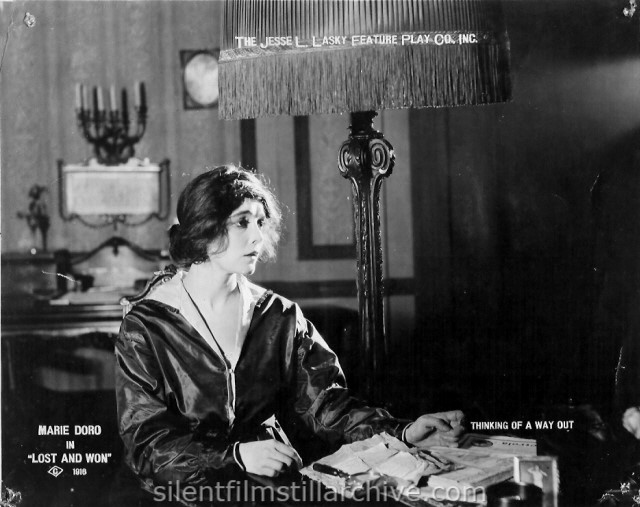Lost and Won (1917)

The Jesse L. Lasky Feature Play Co., Inc.
Marie Doro in "LOST AND WON" © 1916
Caption: "Thinking of a way out."
"Lost and Won"
Marie Doro is Seen in Widely Contrasting Characters and Surrounded by Excellent Cast in Lasky Picture.
Reviewed by George Blaisdell.
MARIE DORO is the heroine of "Lost and Won," the Lasky release of January 22. She is seen both as a newsgirl and as a young woman with a year's training in a fashionable school, later blossoming out as a newspaper reporter. The story is melodramatic, and is from the pens of Channing Pollock and Rennold Wolf. It has been well staged by James Young. The picture is entertaining, and at times it is exciting, but Mr. Young did not come on his stage equipped with the same raw material as when he began the production of "Oliver Twist."
The story strains the credulity at times, as when, for instance, it asks us to believe a girl with a year's training in school is sufficiently equipped to take a job as a newspaper reporter. Still, at that, Cinders might have been able to be as good a piece of work as we find in the samples of news story writing we see flashed on the screen. Art directors will scour a big city to find an inconsequential bit of furniture of a period of a century ago, but take it for granted, anything will get by as an opening paragraph of a newspaper yarn or as a spread head, either.
Miss Doro is given excellent support. Robert Grey is Bill Holt, a newspaper reporter; this performance will please those who in life follow similar lines. Elliott Dexter is Walter Crane, the broker who takes chances in his business, and also wagers $50,000 that within one year four of his chums will "fall for" or to a girl that he will take from among the "newsies" and educate and refine. Carl Stockdale is Kirkland Gaige, the unscrupulous banker friend of Crane and so infatuated with Cleo Duvene that in order to obtain jewelry for her, he steals money from the till of Crane. Mabel Van Buren is Cleo, the dashing adventuress, an unusual piece of work. Maym Kelso is the aunt of Crane, who mothers and protects Cinders.
-- Moving Picture World, February 3, 1917, p. 700
"Lost and Won"
(Lasky-Paramount -- Five Reels)
REVIEWED BY GEORGE N. SHOREY
THIS is the story of "Cinders," a little news girl who finds the "Daddy Long Legs" she has been reading about -- for Cinders is a great lover of books -- in the wealthy Walter Crane, who has made a bet with a bank directory, Kirkland Gaige, and four other club friends, that he can make over a little news girl he knows into a lady too attractive every one of this group of pronounced woman-haters will "fall for her on sight."
This clever story by Channing Pollock and Rennold Wolf, in the hands of James Young as director and with Marie Doro, Elliot Dexter, and a cast of Lasky favorites, is worked out with directness of action and enough novel incidents, which do not detract from the dramatic attention to the story, to mark it considerably above average.
Stealing twenty thousand dollars from the bank and accusing Crane, who has in the meantime lost all his money and is now a teller; carrying on a flirtation with a typical vampire Maym Kelso and causing "Cinders" to leave the home of her "Daddy Long Legs" because he tells her "in confidence" Crane cannot afford the expense of her upkeep are a few of the things the "villain" does to give interest to the story. "Cinders" comes to the rescue, with such novel tricks as picking up the pieces of a destroyed record with chewing gum on the end of her umbrella and using Crane's telephone as a "dictaphone" to trap him into a confession.
This play has thrills, punch, and heart interest, in large portions and will do much to strengthen the Lasky score. Miss Doro's expressive dark eyes get in some big touches at opportune moments. We know audiences will like this picture.
-- Motion Picture News, February 3, 1917, pp. 760
"LOST AND WON"
Lasky. Five Reels.
Released Jan. 22 by Paramount.
Cast.
| Cinders | Marie Doro |
| Walter Crane | Elliott Dexter |
| Kirkland Gaige | Carl Stockdale |
| Cleo Duvene | Maym Kelso |
| Bill Holt | Robert Gray |
Story -- Drama of newspaper life. Written for the screen by Channing Pollock and Rennold Wolf. Screen adaption by Margaret Turnbill.
Action -- Interesting
Continuity -- Broken
Suspense -- Fair
Detail -- Good
Atmosphere -- Excellent
Photography -- O.K.
Remarks.
This is the story of a girl "newsboy" whom a millionaire sends away to school in order to win a wager made with four companions that he can pick a woman off the streets who will eventually be married to one of the four.
The men fall in love with the girl, but one of them brings about the downfall of the club man making the bet and he is thrown into prison. The girl, once an old friend of a newspaper man, gets a job on a paper and in turn ruins the clubman who had ruined her benefactor.
Marie Doro, the newspaper waif, gives an excellent portrayal of this part, while she is equally as good in her better surroundings.
Box Office Value.
Three days. Advertise Marie Doro.
-- New York Clipper, January 24, 1917, p. 34
With Marie Doro and Elliott Dexter. Directed by Frank Reicher. Lasky/Paramount.
More Information on this Film

This work (Lost and Won (1917), by Lasky/Paramount), identified by Bruce Calvert, is free of known copyright restrictions.
Books
None





